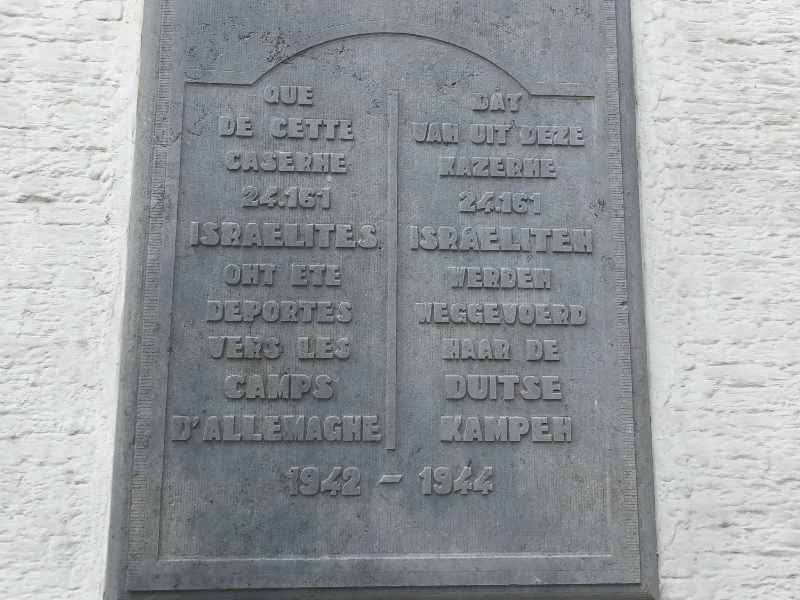A few years ago in Toronto, I had a chance encounter with a Belgian mother and her young son. She and her husband were successful professionals and firmly established there, yet they had decided to leave Belgium after the 2014 terrorist attack at the Jewish Museum in Brussels. They no longer felt safe as Jews, she said.
When they decided to move, Toronto had seemed like a prime candidate. But the family had in fact excluded Toronto as a choice for their future home, as they believed that the policies being adopted now in Canada, along with certain demographic shifts, would result in Canada’s Jews having the same problems as Belgium’s Jews. They didn’t want to have to move twice.
Last year, when my son obtained a summer internship in Brussels, I realized it was a great opportunity to see the situation on the ground for myself, and to learn more about my late godparents, Rena and Albert Bacman, who had come to Montreal from Belgium and had been prisoners there during the Nazi occupation. I didn’t know much more than that, but I wanted to find out (and also to visit my son).
We visited Kazerne Dossin, the Nazi internment and deportation camp located in Mechelen, a town just outside Brussels where my godparents had been imprisoned for two years. The original barracks still stand today, though many of them were, unbelievably, sold off in the 1980s to a developer who created apartments in the actual barracks structure. Residents live in the same spot – barbecuing on terraces overlooking the same courtyard – where tens of thousands of Jews were herded, mistreated and sent to their deaths.
The camp operated from 1942 to 1944, imprisoning 25,484 Jewish men, women and children from Belgium and northern France and preparing them, through humiliation, mistreatment, lack of hygiene and malnourishment, for their eventual deportation in cattle cars to Auschwitz-Birkenau. Only 1,221 survived. In the museum nearby, which opened in 2012, a wall of photos notes those who were deported and perished but also those few who survived. Their pictures are circled in yellow.
The documentation centre located in a section of the original barracks is an amazing source of information for researching family members, representing 30 years of unrelenting effort to recover all original documents regarding each prisoner and deportee from the prewar period up to and after liberation. We viewed hundreds of documents, audio-visual materials and pictures. I also learned about the heroism of my godparents, who helped others at Kazerne Dossin by providing mothers with extra rations for them and their children, as well as managing to help those outside of the Kazerne avoid imminent detection.
Back in Brussels, we were out at a restaurant when we struck up a conversation with a sophisticated older Belgian woman and her daughter. Our pleasant, casual conversation took a sudden, strange turn when they found out we were Jewish (we had asked if they knew where the main synagogue was located). Abruptly, the lady started talking about the Israeli-Palestinian conflict, and how bad the Israelis were for taking all the land away from the Palestinians. We were speechless.
Many Belgian Jews are seeing the same warning signs, heeding them and choosing to leave. It begs the question that Jewish-Belgian mother raised to me a few years ago: will we notice warning signs in time, if they should occur in Canada? Is Canada on a path that would bring the same kinds of problems Jews from Belgium and other countries in Europe are facing? Canadian Jews need to learn from the situation in Belgium, France, the U.K. and Germany, and recognize the warning signs of anti-Semitism within institutions of learning and our political class. Hopefully, we still have the ability to act against this existential threat.
My search to learn more about the difficult journeys of my godparents led me to encounters in Belgium that struck me at a personal level. Those experiences have now alerted me to the threat that complacency and comfort can pose to the future of Jewish life as we now know it in Canada, a life that we cannot take for granted. We need to listen for the too-familiar sound of anti-Semitism when it is only a distant rumbling, lest it should come to overpower the wonderful song of tolerance that we currently sing in this country.
If my godparents were alive, I think they would be the first to put their ears to the ground.
